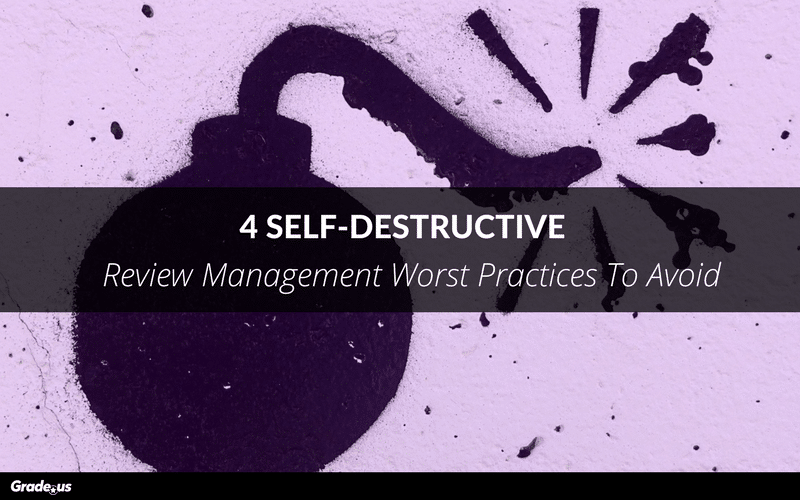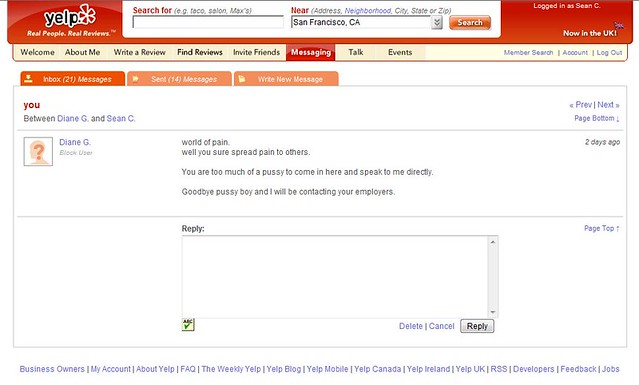Are you making any of these mistakes? The ones considered to be the online review management worst practices?
The kind of mistakes that rub customers the wrong way, complicates your review management and hurts your revenue? When it comes to online review management, there are a lot of bad habits floating around. Some of these mistakes are obvious while others aren't.
Then there's the worst of the bunch.
The silent killers. The mistakes that erode your conversion rate, customer goodwill and your profits.
These bad habits are the worst, but they don't look that way
Quite the opposite in fact.
Ask insiders about these mistakes and you'll see the alarm in their face. Ask outsiders and they'll draw a blank. Almost inevitably they ask, "what's the big deal?"
Most don't care.
They're focused on maintaining the status quo. Putting out fires, avoiding pain, consequences or trouble. This attitude is subtle but it's everywhere. Even worse, this attitude is a breeding ground for the horrible mistakes we'll cover today.
These mistakes do their destructive work quietly.
Let's take a look.
Mistake #1: Dysfunctional, haphazard marketing
Good review management begins with precise marketing. If you're getting more negative reviews than you'd like your marketing may be the problem. Haphazard marketing invites these toxic customers into your business.
These toxic customers tend to be entitled. They expect you to bend over backwards for a chance to earn their business. Fail to please them and they'll leave nasty reviews. These customers typically come in 5 toxic varieties but their goal remains the same.
To take as much as they can from you.
1. The Arranger manipulates circumstances, deals and events. These customers want everything to be win/lose in their favor. Arrangers demand custom options that don't exist, push for concessions that only benefit them or change terms and agreements.
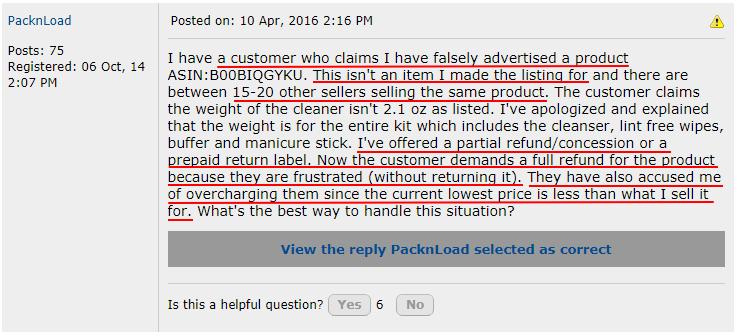
The Arranger looks for flexibility. They comb through your marketing looking for a few specific ingredients (a.) A fear of losing the business and (b.) An unhealthy willingness to be flexible.
Handing out free estimates to any customer who asks, stating "the customer is always right" or "we're here to make you happy" attracts Arrangers.
2. The Corrupter is a liar. You can count on them to be consistently dishonest and unethical. They'll do or say anything to get what they want. The lie to your face, ask you to lie for them or pester you to do morally questionable things.
Like demanding a refund for half eaten pizzas.
Corrupters are attracted to marketing that shows (a.) you have poor boundaries and (b.) No quid pro quo (this for that). If customers ask for a concession, they should be willing to give one in return. Companies with strong boundaries, clear policies and the ability to say No repel Corrupters.
3. The Disruptor craves control. These customers will accept nothing less. These are the customers that boss your employees around. They refused to use your products as intended, demand special treatment and throw epic tantrums when they don't get their way.
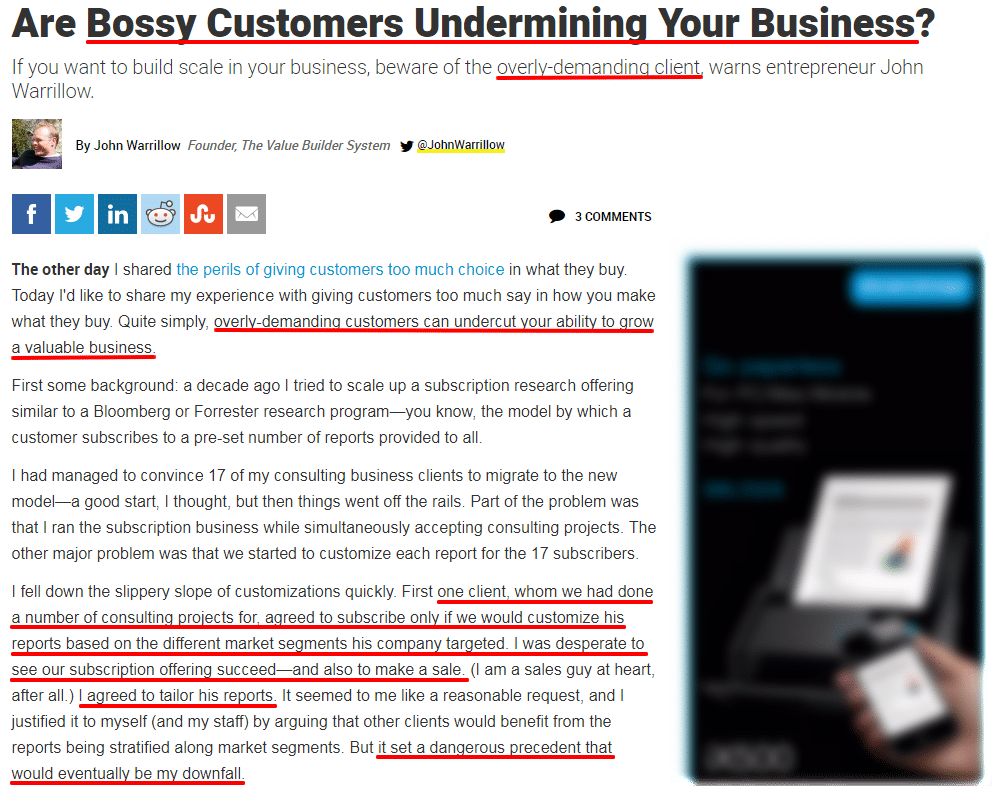
Disruptors are drawn to marketing messages like:
- Have it your way
- The customer is king
- Designed around you
Marketing messages like these scream you're in control. Revoke that control at any time during the relationship and Disruptors look to retaliate.
4. The Slanderer uses guilt, shame and fear to punish and control. These customers play the role of persecutor. They use insults, threats, bullying - anything they can to get you to break. When you lose your cool they quickly become a victim, using your behavior as justification. To break their promises, push for concessions or seek revenge.
Slanderers probe for weakness. If your business lacks measurable uniqueness you're vulnerable. The Slanderer pings your sales, marketing and customer service teams with guilt, fear and shame. They believe there's nothing special about your business. Will remind you often, using that as their "in" to get what they want.
- Bah your product is overpriced!
- You guys try too hard. You’re trying to be something you’re not.
- What makes you so special?
- You guys are lucky to have me as a customer.
Then, they watch how you respond. Beg for their business, fall for their tricks and they'll do their best to wear you down in the process.
5. The Schemer hunts for loopholes. They're resourceful customers, searching for a way over, under, around or through your rules. These customers are all about gaming the system, your system.

Do you make promises to your customers in your marketing? Does your product or service come with a guarantee? Watch out! Schemers target these areas first.
Schemers look for ways to extract as much as they can from your business without giving you anything in return. A 90 day guarantee with no boundaries, conditions or requirements is a schemers paradise. They'll use your incomplete promises to extract refunds, free products, incentives and more indefinitely.
Fail to keep your promises and Schemers become hostile.
These toxic customers are drawn to needy, insecure and dysfunctional marketing.
Okay.
How do you create marketing that's healthy and precise? The kind that attracts wonderful reviews, draws in amazing customers and generate lots of revenue? It's actually pretty simple. You run your marketing through a filter. Three filters to be exact.
1. You're a negotiator. There's only three ways to exist in a relationship. As a tyrant, slave or negotiator. Average or unremarkable companies are slaves to their customers. This entices customers to play the role of tyrant. Great companies exist as negotiators, creating value for customers and themselves.
2. You're in demand. A steady flow of traffic, leads and sales eliminates desperation almost completely. There's no need to be obsessed with a particular prospect if you have 50 or more waiting to talk with you. Good marketing keeps your business in demand.
3. You can say No. When you're in demand you can say No. While you'd hate to lose a customer, it won't break you. Good marketing gives you power and the ability to approach potential customers as equals. As a negotiator.
Great marketing primes the review management pump, cultivating authority, credibility and respect for your business.
Mistake #2: Manipulating customers with generalizations, insincerity and platitudes
Carrol Amrich has just purchased an airline ticket. There's been a family emergency. Her mother is dying. She really needs to get home ASAP.
As she's sitting in her seat a flight attendant tells her that her ticket has been cancelled and refunded by the system due to an error.
She tries to explain. She's paid for a ticket. That she has the right to be here and that she really, really needs to get home to her mother. The attendant throws her off the plane anyway stating "nobody flies for free." Carrol jumps in her car and drives 1,000 miles, rushing to get to her mother in time to say goodbye.
She was too late.
Carrol's mother dies before she arrives. She cries the whole way home. United airlines responds with generalizations, subtly blaming Carrol for their mistake.
"I am just so sorry for Ms. Amrich’s loss. It is tragic. I understand it was unfortunate the ticket ended up voided. Had she contacted us directly to make the change, this all would have been avoided."
A United airlines representative reached out to Carrol's landlord to ask where they could send flowers.
"What are the flowers going to do? You took away from her that she might have been able to see her mother alive. If I’d have been at that gate, I would have done everything in my power to get her back on that plane."
Dragging paying customers off their planes, canceling tickets and booting customers. United's actions speaks volumes doesn't it? They're showing they don't really care about their customers.
United's story is an extreme example. But these mistakes - the generalizations, insincerity and platitudes - they're all around you.
Your competitors do this to your customers on a daily basis.
How?
When something goes wrong (e.g. negative review, unhappy customer, poor experience), sellers shift their focus to damage control by:
· Sharing responses that seem insincere or disingenuous (i.e. we're so sorry to hear you had a bad experience)
· Hitting customers with crude generalizations (i.e. your satisfaction is so important to us at ABC corp.)
· Immediately attempting to hide, to take the conversation offline (DM me your details so we can talk.)
· Moving to patch the situation with as little time, money, resources, manpower as possible
· Ignoring customers once the crisis has died down
It's a horrible but incredibly common practice.
Here's why this is so damaging. These bad habits are upsetting for many customers. When a company makes these mistakes customers realize they don't matter to them. But these mistakes aren't always serious enough for customers to say something.
Best-case scenario they write a negative review. Worst case, they disappear never to return.
This is an incredibly huge opportunity for you to pull ahead of your competitors. To win amazing reviews from passionate customer evangelists. Here's how:
· Expect pain. When customers are hurt or unhappy expect that you'll be hurt as well. This shows customers you're willing to go to their dark place with them. That you're reliable and someone to be counted on
· Ask customers about their experience, what happened, what they'd like to see happen, what you can do to make it right, etc. This shows you're taking them seriously which shows you care.
· Follow their lead. Do customers feel like venting about you on Yelp? Engage them there. Are customers posting Facebook comments on a negative review? Jump into the conversation, if only to listen. Forget about rebuttals. Focus on listening, learning and understanding and you'll have the info you need to best resolve the crisis.
· Spend what it takes to fix the problem properly. United dragged David Dao off their planes. Their share price dropped 12 percent, costing them 1.3 billion. Then they had to settle with Dao for an untold sum speculated to be in the millions. Then there's the intangible loss, the loss of customer goodwill.
· Follow up with customers, checking in periodically from time to time to verify that their problems have been resolved.
Customers recognize sincerity. They recognize those who care about them. Review management depends on relationships, but more and more companies treat customer relationships like a to-do item on a checklist. No wonder review management is hard for them.
Mistake #3: Review retaliation
Sean C., wrote a negative review about his neighborhood bookstore. In his review he mentioned the bookstore was dirty and disorganized, calling it a total mess.
That's bad news, but it's within the realm of fixable. That is, until the bookstore owner retaliates. She begins sending Sean vicious and threatening messages on Yelp.
Sean took screenshots of course and forwarded them to Yelp. Then, the business owner decided to track Sean down. Uninvited.
At his house.
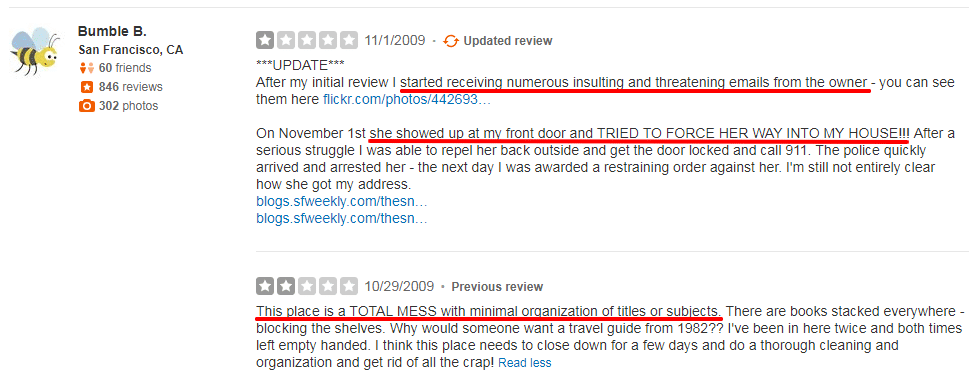
A fist fight breaks out between Sean and the business owner. The police are called. Arrests were made. The situation continues to escalate.
Retaliation operates on a continuum.
When customers write a negative review the responses are generally less than enthusiastic. This makes sense because negative reviews are unpleasant. But it's actually good news because you have a chance to fix the problem.
Many organizations choose instead to retaliate. They...
1. Ignore negative reviews because they're angry or they don't know what to say
2. Behave as a victim. Apologize and begrudgingly fix the problem
3. Respond with insincerity, generalizations and platitudes
4. Use sarcasm, condescension and contempt to belittle customers
5. Abuse customers with insults, threats or personal attacks
6. Threaten customers with negative consequences (e.g. physical violence, lawsuits, job loss, etc.)
The continuum scales up from there with horrifying results. While the Consumer Review Fairness Act protects reviewers from being sued, it doesn't stop employers from retaliating entirely.
Your intention may not be to retaliate. Make these mistakes and customers are hard-pressed to think otherwise. Does this mean you respond to each and every review?
Absolutely not.
The research is pretty clear. Unless it's explicitly stated, customers typically aren't looking for you to respond to their positive reviews. Responding to negative reviews on the other hand, increases sales and revenue dramatically.
Which is something you absolutely should do.
Because responding shows customers you care. It shows prospective customers what to expect when they work with you. It gives you the results you're looking for.
It's an opportunity in disguise.
Mistake #4: Asking for a positive review
A recent study found 68 percent of customers leave reviews when asked. Here's the problem. Most organizations ask for positive reviews. Oh sure, the ask is always implicit but customers know what you're looking for. After all, who in their right mind would ask for a negative review?
You would, if you're smart.
Savvy organizations ask for reviews the right way. They make it safe. They explicitly state that it's okay for customers to write a positive or negative review. For customers to be brutally honest. These organizations know.
Reviews are the canary in the coal mine.
When it's safe for customers to share their feedback they open up. They tell you about your business, what's working well for them, what's not working well. If you ask 100 customers for review and 90 of them come back negative, you know you have work to do.
It's much better to get ahead of the problem and find out first.
The intel you'll receive is unbelievable. If your customers are satisfied, the reviews will be positive. You're looking for a 5 to 1 ratio of positive to negative reviews. Anything less than that and you have a lot of work to do.
What if it's all negative?
Are you finished? Have you created a problem you can't undo?
Not at all.
Customers are actually pretty forgiving. They're willing to give you a second chance if they see that you're willing to fix the problem. Respond openly and honestly to negative reviews and you'll actually increase your sales and revenue. A negative review isn't the bogeyman, it's retaliation.
What's the big deal?
So you ask customers for a positive review. You worked really hard and you did a great job. Is a positive review too much to ask for?
It is.
Customers know where you went wrong. If they're unhappy they know it. When you ask for a positive review you send the implicit message that you don't want to know. That you want your customers to lie for you. A lie of omission.
You seed the relationship with distrust.
It's a small insignificant seed at first. It takes time to grow. But it does significant damage when it's ignored. Because it silently positions your organization as untrustworthy.
What if these mistakes work for your competitors?
These mistakes may work in the short term, but the damage begins immediately. That's the funny thing about relationships. The changes that take place in a relationship aren't immediately noticeable. The consequences may accumulate over a significant period of time.
Could be months, years even.
The fall out that follows makes review management incredibly difficult.
These businesses struggle to survive. Ethereal relationship factors - kindness, trust, genuineness, reciprocity, honor, etc., these details dictate whether customers pursue you or your competitors. It's about what you do, not what you say.
You don't have to make their mistakes.
These bad habits are deceptively dangerous. They're silent killers, eroding conversion rates, destroying customer goodwill, eating away profits. This doesn't have to be your story. Eliminate these bad habits and your online reviews will pay dividends, attracting the right kind of customers, reviews and sales.
About the Author
Andrew McDermott
Andrew McDermott is the co-founder of HooktoWin. He shows entrepreneurs how to attract and win new customers.

